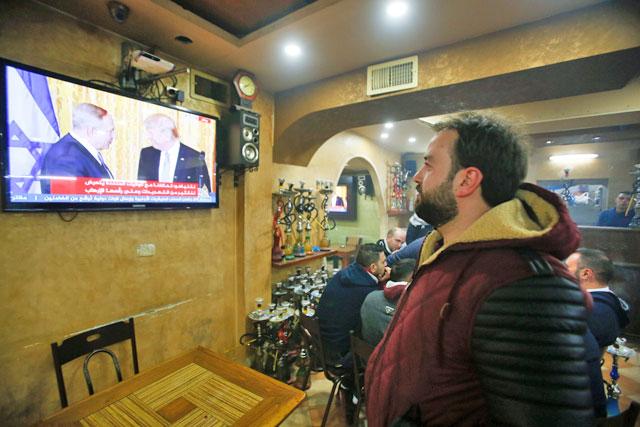You are here
Meeting Israel’s Netanyahu, Trump avoids commitment to 2-state solution
By Reuters - Feb 15,2017 - Last updated at Feb 15,2017

A car drives along a road near the Israeli separation barrier in the Palestinian town of Abu Dis in the West Bank, as Jerusalem is seen in the background, on Wednesday (Reuters photo)
WASHINGTON — President Donald Trump on Wednesday urged Israeli Prime Minister Benjamin Netanyahu to curb settlement activity but avoided any explicit endorsement of a two-state solution to the Israeli-Palestinian conflict, a longstanding bedrock of US Middle East policy.
The two leaders met face-to-face for the first time since Trump's victory in the 2016 presidential election even as Palestinians urged the White House not to abandon their goal of an independent state.
Speaking at a joint news conference, Trump vowed to work towards a peace deal between Israel and Palestinians but said it would require compromise on both sides and it would be up to the parties themselves ultimately to reach an agreement.
"I'd like to see you pull back on settlements for a little bit," Trump told Netanyahu. The right-wing Israeli leader later insisted that Jewish settlements were "not the core of the conflict" and made no commitment to reduce settlement building.
Trump echoed Netanyahu's calls for Palestinians to recognise Israel as a Jewish state — something they have refused to do — and to halt incitement against Israelis.
But even as Trump promised to pursue peace between the two sides — who have had no substantive peace talks since 2014 — he offered no new prescriptions for unblocking the peace process or achieving a deal that has eluded so many of his predecessors.
Setting a chummy tone for the meeting, Trump greeted Netanyahu on a red carpet rolled out to the White House driveway. The two leaders smiled, shook hands and chatted amiably before heading inside the executive mansion, accompanied by First Lady Melania Trump and Netanyahu’s wife Sara.
Among the questions expected to figure prominently on the agenda was the future of the two-state solution — the idea of creating a Palestine living peacefully alongside Israel, which has been a bedrock US position.
In a potential shift, a senior White House official said on Tuesday that peace did not necessarily have to entail Palestinian statehood, and Trump would not try to “dictate” a solution.
Trump did little to clarify his position. Giving a convoluted response to a question on whether he backed a two-state solution, he suggested that he could abide by whatever the two parties decided.
“I’m looking at two-state and one-state and I like the one that both parties like. I’m very happy with the one that both parties like,” he said.
“I can live with either one. I thought for a while it looked like the two-state, looked like it may be the easier of the two, but honestly if Bibi and if the Palestinians, if Israel and the Palestinians are happy, I’m happy with the one they like the best,” Trump said, referring to Netanyahu by his nickname.
A retreat from US backing for a two-state solution would upend decades of US policy embraced by Republican and Democratic administrations and a principle considered the core of international peace efforts.
Netanyahu committed, with conditions, to the two-state goal in a speech in 2009 and has broadly reiterated the aim since. But he has also spoken of a “state minus” option, suggesting he could offer the Palestinians deep-seated autonomy and the trappings of statehood without full sovereignty.
Palestinians alarmed
Palestinians reacted with alarm to the possibility that Washington might ditch its support for an independent Palestinian nation.
“If the Trump administration rejects this policy it would be destroying the chances for peace and undermining American interests, standing and credibility abroad,” Hanan Ashrawi, a senior member of the Palestine Liberation Organisation, said in response to the US official’s remarks.
“Accommodating the most extreme and irresponsible elements in Israel and in the White House is no way to make responsible foreign policy,” she said in a statement.
Husam Zomlot, strategic adviser to Palestinian President Mahmoud Abbas, said the Palestinians had not received any official indication of a change in the US stance.
For Netanyahu, the talks with Trump are an opportunity to reset ties after a frequently combative relationship with Democrat Barack Obama, Trump’s predecessor. After speaking to reporters, the two leaders were due to hold talks in the Oval Office followed by a working lunch.
The prime minister, under investigation at home over allegations of abuse of office, spent much of Tuesday huddled with advisers in Washington preparing for the talks. Officials said they wanted no gaps to emerge between US and Israeli thinking during the scheduled two-hour Oval Office meeting.
Trump, who has been in office less than four weeks and has already been immersed in problems including the forced resignation of his national security adviser earlier this week, brings with him an unpredictability that Netanyahu’s staff hope will not impinge on the discussions.
The two leaders, who seemed to strike up an emerging “bromance” in social media exchanges since the election, sought to demonstrate good personal chemistry face-to-face as well, both sporting smiles and exchanging asides.
Meetings with Obama were at best cordial and businesslike, at worst tense and awkward. In one Oval Office encounter in 2011, Obama grimaced as Netanyahu lectured him in front of the cameras on the suffering of the Jewish people through the ages.
Related Articles
SYDNEY — Australian Prime Minister Malcolm Turnbull offered a staunch defence of Israel on Wednesday, criticising the United Nations and vow
OCCUPIED JERUSALEM — Construction on new Israeli settlement units in the occupied West Bank rose by 40 per cent in 2016 compared with the pr
OCCUPIED JERUSALEM — Donald Trump’s shelving of the decades-long goal of a two-state solution to the Middle East conflict has excited Israel














